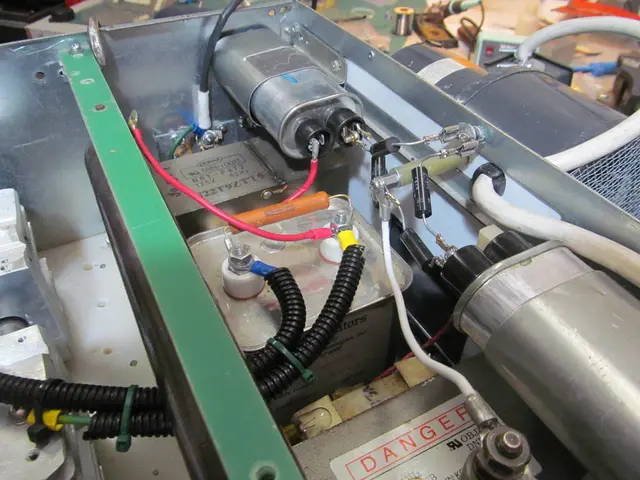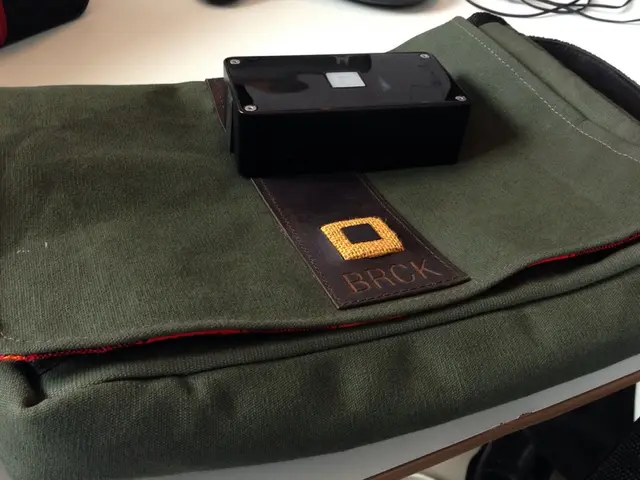Introducing a novel method in tissue reconstruction, promising enhanced healing, free of surgical stitches.
Tissium, a biotech company founded in 2013, has made a significant breakthrough in the field of tissue repair. The Food and Drug Administration (FDA) has granted marketing authorization for Tissium's non-traumatic, sutureless solution designed for repairing peripheral nerves.
This De Novo marketing authorization acknowledges the novelty of Tissium's platform, paving the way for commercialization. The company's flexible polymer technology offers an atraumatic way to reconnect nerves, making it a promising alternative to traditional mechanical solutions like sutures and staples.
The innovation lies in Tissium's biopolymer technology that creates flexible, biocompatible polymers. These polymers conform to and attach to surrounding tissues, providing a less invasive and more tissue-friendly method of tissue fixation. The polymer is activated using blue light, ensuring a sutureless approach that avoids the damage caused by traditional methods.
In a recent trial involving 12 patients, all patients who completed follow-up regained full flexion and extension of their injured digits and reported no pain 12 months after surgery. This is a significant improvement over traditional repair methods, as a recent meta-analysis of nerve repairs using sutures found that only 54 percent of patients achieved highly meaningful recovery following surgery.
Tissium's first product is expected to revolutionize the standard of care in peripheral nerve repair. The company is also developing six additional products, including one ongoing clinical trial in the hernia space and another set to begin soon for a cardiovascular application.
The success of Tissium is attributed to the MIT and Harvard ecosystems, where the technology was initially developed. Maria Pereira, a visiting PhD student in Jeff Karp's lab, optimized the polymer's ability to attach to wet tissue, and Karp, a postdoc in the lab of MIT Institute Professor Robert Langer, developed elastic materials that were biodegradable and photocurable for clinical applications.
Tissium's team is encouraging people in the medical field to reach out if they think their platform could improve on the standard of care. The company is eager to apply its programmable platform to other areas beyond its current applications, with the potential to improve the standard of care in various medical fields.
This first approval is a milestone worth celebrating, as it marks the potential to improve patients' lives by offering a safer, more effective, and less traumatic solution for tissue repair.
- The novelty of Tissium's platform has been acknowledged with a De Novo marketing authorization, paving the way for commercialization of their technology.
- Tissium's flexible polymer technology offers an atraumatic way to reconnect nerves, making it a promising alternative to traditional mechanical solutions like sutures and staples.
- The innovation lies in Tissium's biopolymer technology that creates flexible, biocompatible polymers, which conform to and attach to surrounding tissues.
- In a recent trial involving 12 patients, all patients who completed follow-up regained full flexion and extension of their injured digits and reported no pain 12 months after surgery.
- Tissium's first product is expected to revolutionize the standard of care in peripheral nerve repair, while they are also developing six additional products for various medical fields.
- The success of Tissium is attributed to the MIT and Harvard ecosystems, where the technology was initially developed, specifically by Maria Pereira and Jeff Karp.
- Tissium's team is encouraging people in the medical field to reach out if they think their platform could improve the standard of care in different medical-conditions, including health-and-wellness, therapies-and-treatments, and possibly even cardiovascular applications.
- This first approval is a milestone worth celebrating, as it marks the potential to improve patients' lives by offering a safer, more effective, and less traumatic solution for tissue repair.
- The company's groundbreaking technology has the potential to lead to significant breakthroughs in the field of tissue repair and medicine.
- With ongoing clinical trials and planned future developments, Tissium aims to secure patents and secure funding for further research in the realm of science, space, and technology.




